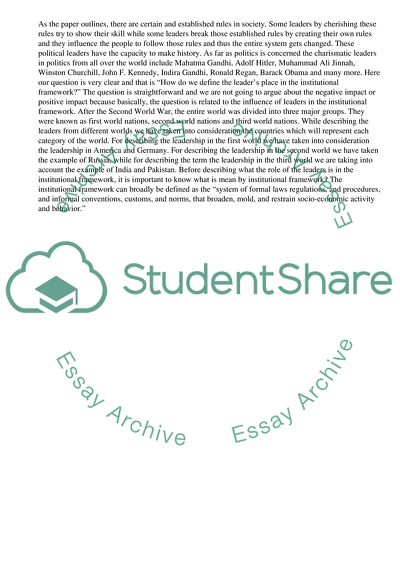Cite this document
(Leaders Place in the Institutional Framework Research Paper, n.d.)
Leaders Place in the Institutional Framework Research Paper. Retrieved from https://studentshare.org/management/1724210-how-do-we-define-the-leaders-place-in-a-countrys-institutional-framework-does-this-framework-generate-such-leaders-or-is-their-power-facilitated-through-it-is-the-process-leading-to-the-rise-of-third-world-political-leaders-different-and-if-so
Leaders Place in the Institutional Framework Research Paper. Retrieved from https://studentshare.org/management/1724210-how-do-we-define-the-leaders-place-in-a-countrys-institutional-framework-does-this-framework-generate-such-leaders-or-is-their-power-facilitated-through-it-is-the-process-leading-to-the-rise-of-third-world-political-leaders-different-and-if-so
(Leaders Place in the Institutional Framework Research Paper)
Leaders Place in the Institutional Framework Research Paper. https://studentshare.org/management/1724210-how-do-we-define-the-leaders-place-in-a-countrys-institutional-framework-does-this-framework-generate-such-leaders-or-is-their-power-facilitated-through-it-is-the-process-leading-to-the-rise-of-third-world-political-leaders-different-and-if-so.
Leaders Place in the Institutional Framework Research Paper. https://studentshare.org/management/1724210-how-do-we-define-the-leaders-place-in-a-countrys-institutional-framework-does-this-framework-generate-such-leaders-or-is-their-power-facilitated-through-it-is-the-process-leading-to-the-rise-of-third-world-political-leaders-different-and-if-so.
“Leaders Place in the Institutional Framework Research Paper”, n.d. https://studentshare.org/management/1724210-how-do-we-define-the-leaders-place-in-a-countrys-institutional-framework-does-this-framework-generate-such-leaders-or-is-their-power-facilitated-through-it-is-the-process-leading-to-the-rise-of-third-world-political-leaders-different-and-if-so.


